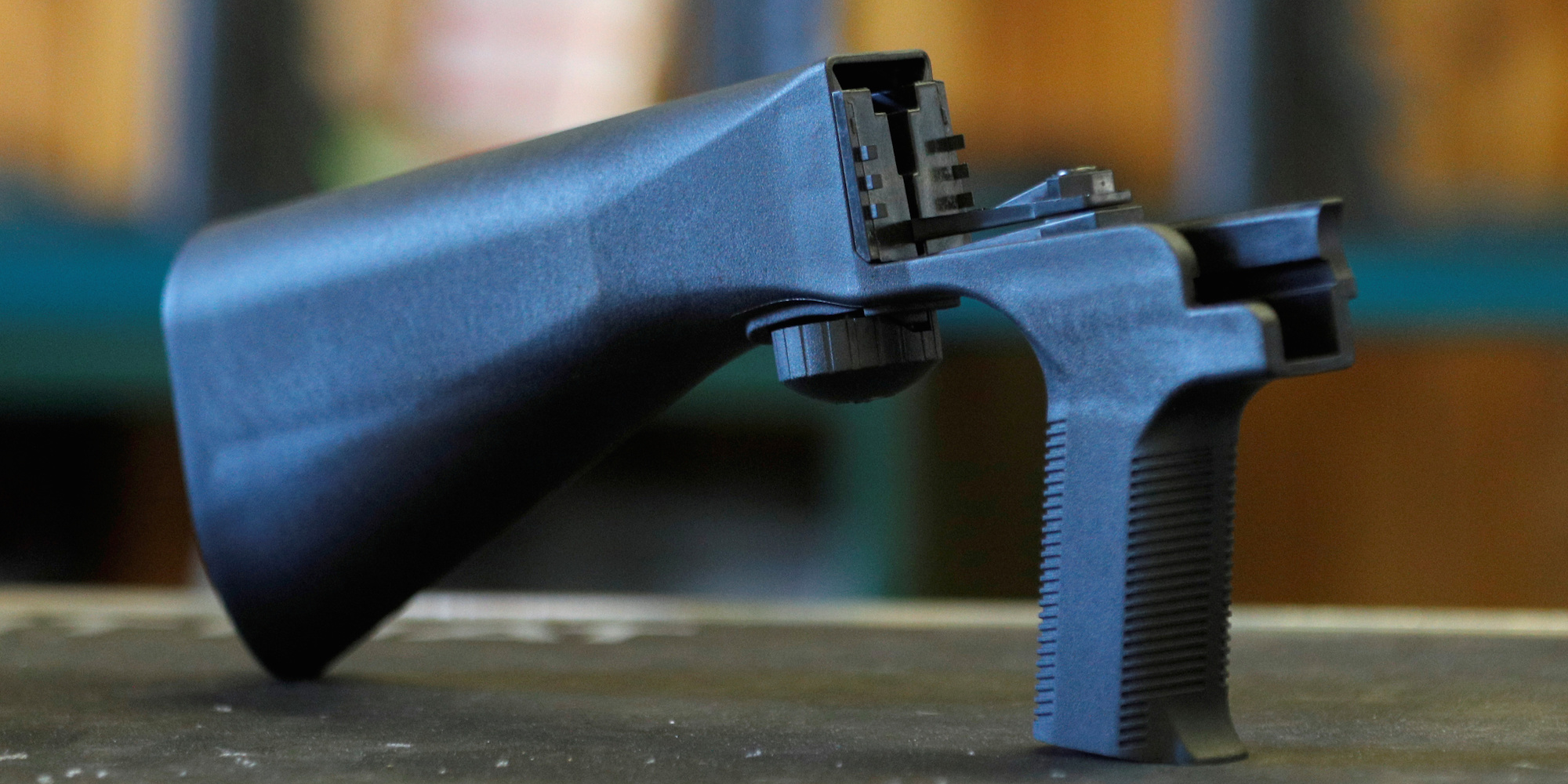- President Donald Trump said he had directed the Justice Department to propose a ban on gun modifications such as so-called bump stocks.
- The gunman in last year’s massacre in Las Vegas used the devices to increase the rate of fire of his semiautomatic rifles.
- Trump’s move comes less than a week after a mass shooting at a high school in Florida, though that gunman did not use a bump stock.
President Donald Trump said Tuesday that he had directed the Justice Department to propose a ban on devices that modify guns, such as so-called bump stocks, which increase the rate of fire of semiautomatic firearms.
In October, Stephen Paddock mowed down a crowd of concertgoers from his 32nd-story hotel room in Las Vegas after affixing bump stocks to at least 12 of his semiautomatic rifles.
Trump’s move comes less than a week after a shooting at a high school in Parkland, Florida, left 17 people dead. The gunman did not use a bump stock on his AR-15 rifle, but the shooting has renewed a national debate about various gun-control measures.
Trump said in a memo released by the White House on Tuesday that a ban should apply to “all devices that turn legal weapons into machine guns.”
Trump announced the directive during a ceremony at the White House to award the public-safety Medal of Valor, saying he was grieving for the community of Parkland.
"We cannot imagine the depths of their anguish, but we can pledge the strength of our resolve," Trump said. "And we must do more to protect our children. We have to do more to protect our children."
What is a bump stock?

A bump stock can be legally purchased and installed onto a semiautomatic firearm, such as AR-15, AK-47, and Saiga models, replacing the rifle's standard stock.
Unlike automatic firearms, which fire continuously while the trigger is pulled, semiautomatic weapons fire one round per trigger pull.
The bump stock harnesses the recoil energy produced when a shot is fired from a semiautomatic rifle to "bump" the weapon back and forth between the shooter's shoulder and trigger finger.
Since the shooter is still pulling the trigger for each shot, the firearm technically remains semiautomatic, even as it achieves a rate of fire similar to that of an automatic one.
Trump has blamed the Bureau of Alcohol, Tobacco, Firearms, and Explosives under the Obama administration for designating bump stocks as legal devices in 2010.
A spokeswoman for the bureau recently said it did so because it determined that the devices "do not actually alter the firearm to fire automatically, making them legal under current federal law."
Shortly after the Las Vegas shooting, the Trump administration ordered a review of that 2010 ruling. Trump's memo on Tuesday directed the Justice Department under Attorney General Jeff Sessions to "dedicate all available resources to complete the review" and propose a rule banning the devices.
"Although I desire swift and decisive action, I remain committed to the rule of law and to the procedures the law prescribes," the memo said. "Doing this the right way will ensure that the resulting regulation is workable and effective and leaves no loopholes for criminals to exploit."
Legislative options are less clear

The White House on Monday signaled that Trump was open to supporting stricter gun-control legislation in the wake of the Parkland shooting.
The White House press secretary, Sarah Huckabee Sanders, said in a statement that Trump spoke with Republican Sen. John Cornyn of Texas about a bipartisan bill to improve federal background checks for prospective gun buyers. Democratic Sen. Chris Murphy of Connecticut is a cosponsor of the legislation.
"The President spoke to Senator Cornyn on Friday about the bipartisan bill he and Sen. Murphy introduced to improve Federal Compliance with Criminal Background check Legislation," Sanders said. "While discussions are ongoing and revisions are being considered, the President is supportive of efforts to improve the Federal background check system."
The bill would penalize federal agencies that fail to provide the necessary records while giving grant preference and other incentives to states that comply.
The senators introduced the bill in November after two of the deadliest mass shootings in modern US history: the massacre in Las Vegas and another at a church in Texas in which 26 people died.
In Florida on Tuesday, legislators voted down an attempt to revive a bill that would ban assault-style rifles.

